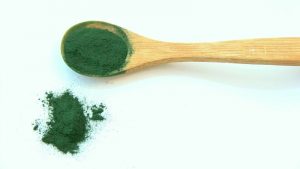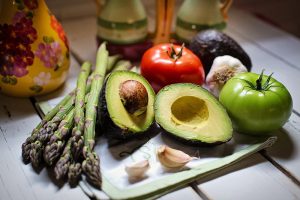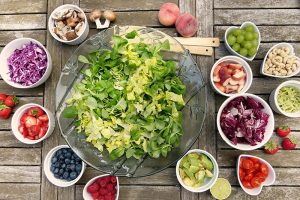Stress is one of the main factors responsible for our well-being. When we feel stressed it is natural to seek relief and there are numerous foods which contain nutrients that help reduce stress levels. Here’s is a list of foods which you can try out!
Acerola
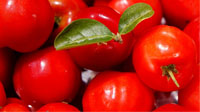
Acerola is one of the main sources of vitamin C. They boast 50-100% more vitamin C than citrus fruits such as oranges and lemons. Vitamin C is involved stress response. In addition, high levels of vitamin C are linked to better moods and lower levels of depression and anger..
Although it can be enjoyed fresh, acerola is a highly perishable fruit. As such, it’s often sold as a powder, which can be added to food or drink.
Matcha powder
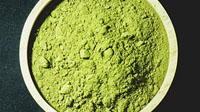
This vibrant green tea powder is popular with health enthusiasts because it is rich in L-theanine, a non-protein amino acid with powerful anti-stress properties.
Matcha is a better source of this amino acid than other types of green tea, since it is made up of green tea leaves grown in the shade. This process increases the content of some compounds, including L-theanine.
Both human and animal studies show that matcha can reduce stress if its L-theanine content is high enough and its caffeine is low.
Chard

Swiss chard is a green leafy vegetable, rich in nutrients that fight stress.
Only 1 cup of cooked chard contains 36% of the recommended intake of magnesium, which plays an important role in your body’s response to stress.
Low levels of this mineral are associated with conditions such as anxiety and panic attacks. Additionally, chronic stress can deplete your body’s magnesium, making this mineral particularly important when you are stressed.
Sweet potatoes

Eating nutrient-rich carbohydrate sources like sweet potatoes can help reduce cortisol stress hormone levels.
Although cortisol levels are tightly regulated, chronic stress can lead to cortisol dysfunction, which can cause inflammation, pain and other adverse effects.
An 8-week study of women who were overweight or suffered from obesity found that those who followed a diet rich in whole carbohydrates and rich in nutrients had significantly lower levels of salivary cortisol than those who followed a standard American diet rich in refined carbohydrates.
Sweet potatoes are rich in nutrients which are important for response to stress, such as vitamin C and potassium.
Kimchi

Kimchi is a fermented vegetable dish that is typically prepared with napa cabbage and daikon, a type of radish. Fermented foods like kimchi are rich in beneficial bacteria called probiotics and rich in vitamins, minerals and antioxidants.
Research reveals that fermented foods can help reduce stress and anxiety. For example, in a study of 710 young adults, those who ate fermented foods more frequently experienced fewer symptoms of social anxiety.
Many other studies show that probiotic supplements and probiotic-rich foods such as kimchi have beneficial effects on mental health. This is probably due to their interactions with intestinal bacteria, which directly affect your mood.
Artichokes
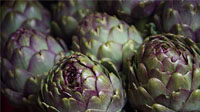
Artichokes are an incredibly concentrated source of fiber and particularly rich in prebiotics, a type of fiber that nourishes the friendly bacteria in the intestine.
Animal studies indicate that prebiotics such as fructoligosaccharides (which are concentrated in artichokes) can help reduce stress levels.
In addition, one review showed that people who ate 5 or more grams of prebiotics per day experienced an improvement in mood, and showed that diets rich in high-quality prebiotics can reduce the risk of stress.
Artichokes are also rich in potassium, magnesium and vitamins C and K, all essential elements for a healthy response to stress.
Eggs

Eggs are often referred to as nature’s multivitamin because of their impressive nutritional profile. Whole eggs are rich in vitamins, minerals, amino acids and antioxidants necessary for a healthy response to stress.
Whole eggs are particularly rich in choline. Choline has been shown to play an important role in brain health and can protect against stress.
Animal studies show that choline supplements can help respond to stress and increase mood.
Parsley
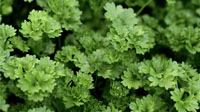
Parsley is a nutritious herb rich in antioxidants, compounds that neutralize unstable molecules called free radicals and protect against oxidative stress.
Oxidative stress is associated with many diseases, including mental health disorders such as depression and anxiety. Studies suggest that an antioxidant-rich diet can help prevent stress and anxiety.
Antioxidants can also help reduce inflammation, which is often high in those with chronic stress.
Parsley is particularly rich in carotenoids, flavonoids and volatile oils, all with powerful antioxidant properties.
Garlic
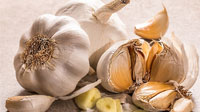
Garlic is rich in sulfur compounds which help increase glutathione levels. This antioxidant is part of the body’s first line of defense against stress.
Tahini

Tahin is a food made from sesame seeds, which are an excellent source of the amino acid L-tryptophan.
L-tryptophan is a precursor of the neurotransmitters that regulate the dopamine and serotonin levels. Following a diet rich in tryptophan can help improve mood and relieve the symptoms of depression and anxiety.
In a 4-day study of 25 young adults, a diet rich in tryptophan led to better moods, a reduction in anxiety and a reduction in the symptoms of depression, compared to a diet low in this amino acid.
Sunflower seeds
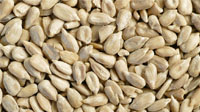
Sunflower seeds are a rich source of vitamin E. This fat soluble vitamin acts as a powerful antioxidant and is essential for mental health.
A low intake of this nutrient is associated with altered mood and depression. Sunflower seeds are also rich in other stress-reducing nutrients, including magnesium, manganese, selenium, zinc, B vitamins and copper.
Broccoli
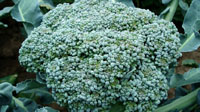
Cruciferous vegetables such as broccoli are renowned for their health benefits. A diet rich in cruciferous vegetables can reduce the risk of certain cancers, heart disease and mental health disorders such as depression.
Cruciferous vegetables such as broccoli are some of the most concentrated food sources of magnesium, vitamin C and folic acid – which have been shown to fight depressive symptoms.
Broccoli is also rich in sulforaphane, a sulfur compound that has neuroprotective properties and can offer calming and antidepressant effects.
In addition, 1 cup of cooked broccoli contains over 20% of the DV for vitamin B6, a higher intake is linked to a lower risk of anxiety and depression in women.
Chickpeas
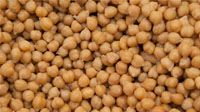
Chickpeas are rich in anti-stress vitamins and minerals, including magnesium, potassium, B vitamins, zinc, selenium, manganese and copper.
These delicious legumes are also rich in L-tryptophan, which your body needs to produce mood-regulating neurotransmitters.
Research has found that plant-rich diets such as chickpeas can help improve brain health and improve mental performance.
Blueberries
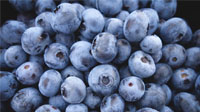
Blueberries are associated with a number of health benefits, including mood improvement.
These berries are rich in flavonoid antioxidants that have powerful anti-inflammatory and neuroprotective effects. They can help reduce stress-related inflammation and protect against stress-related cell damage.
Additionally, studies have shown that eating flavonoid-rich foods like blueberries can protect you from depression and improve your mood.
Source: ambientebio.it

